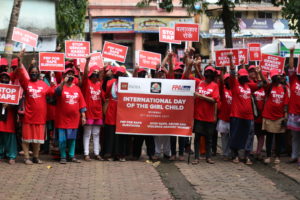by Suman Gupta
 Mumbai, October, 2017: AIDS Healthcare Foundation and Family Planning Association of India organised a silent protest rally to mark International day for the Girl Child, October 11, 2017 in Mumbai. With a central theme of “Zero Tolerance to Violence against Women”, the protest witnessed more than 100 participants from various backgrounds and communities raising their voice against issues like gender equality, child marriage, human trafficking, and forced sex work among others.
Mumbai, October, 2017: AIDS Healthcare Foundation and Family Planning Association of India organised a silent protest rally to mark International day for the Girl Child, October 11, 2017 in Mumbai. With a central theme of “Zero Tolerance to Violence against Women”, the protest witnessed more than 100 participants from various backgrounds and communities raising their voice against issues like gender equality, child marriage, human trafficking, and forced sex work among others.
The protest was followed by a panel discussion on “Say No to Abuse, Rape & Violence” chaired by Dr. V.Sam Prasad, Country Manager, AHF India, Prince Manvendra Singh Gohil, Brand Ambassadors, AHF India, Dr. Kalpana Apte, Secretary General, FPAI, Amita Dhanu, Asst. Secretary General, FPAI and Zainab Patel, Transgender Activist, Policy Analyst Human Rights at UNDP Bangkok Regional Hub. Apart from Mumbai, the silent protest was also driven in 10 major cities across the country including Delhi, Pune, Solapur, Madurai, Dharwad, Bangalore, Gwalior, Yamuna Nagar, and Nagaland.
In order to observe the significance of the day, all the participants at various locations, across the country gathered to pledge for “Zero Tolerance to Violence against Women”. The rally provided a common platform to the young people to raise their voice and take a stand against rape, abuse and early marriage.
Violence in the form of rape has become an everyday occurrence in India, because of which it is getting normalised. Even gang-rape survivors are not provided with Post-Exposure Prophylaxis (PEP) for HIV, STI screening, or even a pregnancy test, post the traumatic experience that they go through. But girls and women are now standing up against this and demanding a right to be protected from any kind of violence.
Commenting on the relevance of the day, Dr. V. Sam Prasad, Country Manager, AHF India, said, “It is time that the patriarchal dominions of the society change ways to accommodate the ever changing -power balances and recognise the role of Womanhood in Nation building. Parents need to discuss on taking equitable roles with their Sons and treating Daughters as partners in building a gender just society. Rape victims and abuse survivors often experience lifelong trauma as they are looked down upon and are ostracised and discriminated. Many are infected with HIV and STI infections and the suffering lasts a lifetime debilitating them forever. Making PEP (Post exposure prophylaxis) available to all rape victims and survivors will avert HIV and STI infections and prevent further trauma of these hapless victims. One needs to look at inculcating the gender equity dialogues into the curriculum right from primary level education and deal this issue with age appropriate messages throughout the formative years and continue into University curriculums. India should decide to end rape and violence against women.”

“Violence is the one thing that disempowers women. And this could be any kind of violence, sexual, emotional, physical, or any other. Doesn’t every woman have a right to prevent this violence from happening? And isn’t the society also equally responsible for the same? But the issue is that society takes objection against violence only after the violence is done… FPA India has been educating and encouraging many young girls and women, to identify and talk about violence and more importantly to deal with it. Because only when we talk about it will the society’s perspective change. Hence FPA India shows zero tolerance towards any kind of violence against women.” said Dr. Kalpana Apte, Secretary General, FPA India.
Prince Manvendra Singh, Brand Ambassador, AIDS Healthcare Foundation, who participated at the rally commented, “It’s not just enough to treat women well but we are also required to make sure all men treat women well. Quoting President Jimmy Carter that the abuse of women and girls is the most pervasive and unaddressed violation of rights on earth. Women must break the silence to stop the violence against them”.
Girls continue to be the most discriminated against and excluded group, as a result they suffer a number of inequalities including having to drop out of school, being forced into early marriages and becoming pregnant whilst still a child. Yet they have the capability to create positive change in their lives and in the world around them.
The world’s 1.1 billion girls are a source of power, energy, and creativity – and the millions of girls in emergencies are no exception. This year’s International Day of the Girl (IDG) on October 11 marks the beginning of a year-long effort to spur global attention and action to the challenges and opportunities girls face before, during, and after crises.[1]
Both FPA India and AHF India have been working for girl empowerment and enabling them to deal with gender based violence. They strongly believe that it is necessary to openly talk about and change the social construct that looks down upon women and considers the issues they face as unimportant.

